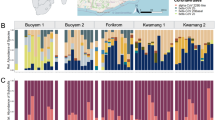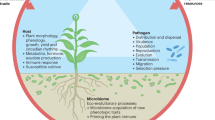Abstract
Ticks affect 800 million cattle and a similar number of sheep worldwide1 and their control by chemical ‘dipping’ is expensive and threatened by the widespread development of resistance2. Resistant varieties of crops have been used widely to control phytophagous insects3, but larvae of all species of hard ticks (Ixodidae) ascend plants only in order to transfer to a passing host. Contacts with hosts are infrequent thus the ticks must often wait in the pasture for several weeks4. A substantial reduction in the life expectancy of such larvae would lower populations of the damaging parasitic stages. Molasses grass Melinis minutiflora, has been shown to reduce tick survival but the effect is small and slow5. Some highly productive, nutritious varieties of the tropical pasture legume Stylosanthes6,7, are covered in glandular trichomes or hairs which secrete a viscous fluid. Such trichomes are well known for their role in defence against a variety of plant-feeding insects3,8. We report here that two South American species of Stylosanthes produce sticky secretions which immediately immobilize larvae of the cattle tick, Boophilus microplus. The larvae are poisoned within 24 hours by an unidentified vapour from the secretions. The legumes appear to have the potential to substantially reduce populations of all species of ticks in the extensive tropical and subtropical areas in which Stylosanthes sp. can be grown in pasture.
This is a preview of subscription content, access via your institution
Access options
Subscribe to this journal
Receive 51 print issues and online access
$199.00 per year
only $3.90 per issue
Buy this article
- Purchase on Springer Link
- Instant access to full article PDF
Prices may be subject to local taxes which are calculated during checkout
Similar content being viewed by others
References
Snelson, J. T. Pl. Prot. Bull. F.A.O. 23, 103–114 (1975).
Wharton, R. H. & Norris, K. R. Vet. parasit. 6, 135–164 (1980).
Norris, D. M. & Kogan, M. in Breeding Plants Resistant to Insects (eds Maxwell, F. G. & Jennings, P. R.) 24–61 (Wiley, New York, 1980).
Sutherst, R. W., Dallwitz, M. J., Utech, K. B. W. & Kerr, J. D. Aust. J. Zool. 26, 159–174 (1978).
Thompson, K. C., Roa, J. & Romero, T. Trop. anim. Hlth Prod. 10, 179–182 (1978).
Burt, R. L., Reid, R. & Williams, W. T. Agro-Ecosystems 2, 293–307 (1976).
Edye, L. A. & Grof, B. in Genetic Resources of Forage Plants (eds McIvor, J. G. & Bray, R. A.) (CSIRO, Melbourne, in the press).
Levin, D. A. Q. Rev. Biol. 48, 3–15 (1973).
Schnitzerling, H. J., Schuntner, C. A., Roulston, W. J. & Wilson, J. T. Aust. J. biol. Sci. 27, 397–408 (1974).
Sutherst, R. W. & Utech, K. B. W. in CRC Handbook of Pest Management in Agriculture Vol 2 (ed. Pimentel, D.) 385–407 (CRC Press, Boca Raton, Florida, 1981).
Sutherst, R. W., Norton, G. A. & Maywald, G. F. in Ticks and Tick-borne Diseases (eds Johnston, L. A. Y. & Cooper, M. G.) 46–51 (Australian Veterinary Association, Sydney, 1980).
Author information
Authors and Affiliations
Rights and permissions
About this article
Cite this article
Sutherst, R., Jones, R. & Schnitzerling, H. Tropical legumes of the genus Stylosanthes immobilize and kill cattle ticks. Nature 295, 320–321 (1982). https://doi.org/10.1038/295320a0
Received:
Accepted:
Issue Date:
DOI: https://doi.org/10.1038/295320a0
This article is cited by
-
Current perspectives and difficulties in the design of acaricides and repellents from plant-derived compounds for tick control
Experimental and Applied Acarology (2024)
-
Adhesive secretion in Schizolobium parahyba (Vell.) Blake (Leguminosae: Caesalpinioideae): histochemical and morpho-functional characterization of this unusual feature in woody plants
Arthropod-Plant Interactions (2022)
-
Essential oils of indigenous plants protect livestock from infestations of Rhipicephalus appendiculatus and other tick species in herds grazing in natural pastures in western Kenya
Journal of Pest Science (2018)
-
Assessment of the acaricidal activity of carvacrol, (E)-cinnamaldehyde, trans-anethole, and linalool on larvae of Rhipicephalus microplus and Dermacentor nitens (Acari: Ixodidae)
Parasitology Research (2013)
-
In vitro and in vivo efficacies of ivermectin and cypermethrin against the cattle tick Hyalomma anatolicum anatolicum (Acari: Ixodidae)
Parasitology Research (2009)
Comments
By submitting a comment you agree to abide by our Terms and Community Guidelines. If you find something abusive or that does not comply with our terms or guidelines please flag it as inappropriate.



